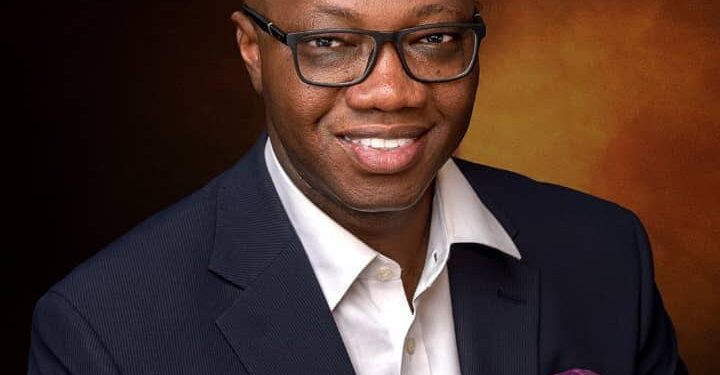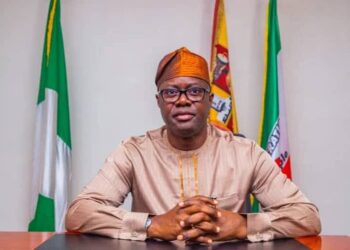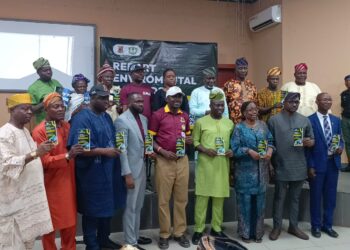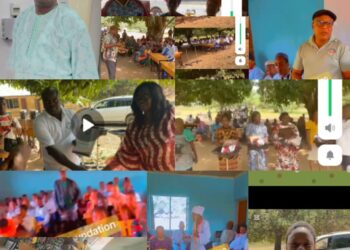Oyo State stands at a poignant juncture – the crossroads of progress and memory. As the pulsating heart of Yoruba culture and a cradle of Nigerian heritage, it is thrust toward industrial modernity. Skyscrapers rise, tech firms emerge—but amid this transformation, we must ask: can progress truly endure without memory? The answer lies in Oyo’s monumental architecture—silent sentinels that bear witness to a rich history of governance, culture, resistance, and faith. They form the cultural DNA that lends identity and soul to a people, a powerful defense against a homogenised global narrative.

Among the most significant of these is a structure that symbolises the very heart of Western Nigeria’s political legacy: Agodi Government House in Ibadan.
A Living Chronicle: The Families of Government House Agodi

Perched on the gentle Ibadan hills, Agodi Government House is more than a canvas of history; it is a home that has absorbed the laughter, fears, and ambitions of the families who lived within its walls. Its story is best told through the unbroken chain of its residents – father, mother, children, friends, mentors and colleagues of ours – whose lives shaped its character.


The dawn of its era began under the Union Jack with its last British Governor, Sir John Dalzell Rankine (1902–1987). From 1954 to 1960, he and his wife, Lady Peta Rankine, presided over a quintessential colonial residence. Their hosting of Queen Elizabeth II and Prince Philip in 1956 was the house’s global debut, an event of meticulous, formal grandeur. The atmosphere changed profoundly when the revered Ooni of Ife, Kabiyesi Sir Adesoji Aderemi (1889–1980), became Governor from 1960 to 1962. With his senior wife, Olori Abiona, Agodi transformed into a unique palace where his children, including educated and accomplished princesses, were often present at receptions, embodying a new, modern royalty. He was succeeded by Chief Joseph Odeleye Fadahunsi (1901–1986), who from 1962 to 1966 resided there during the First Republic’s political crisis. While he held intense negotiations, his wife, Mrs. Elizabeth Adetoun Fadahunsi, ensured the dignity of the residence was maintained amidst the turmoil.
The violent military coup of 1966 brought the house its most tragic chapter. For six months, Lt. Colonel Adekunle Fajuyi (1926–1966) governed, but on July 29th, his famous act of loyalty—refusing to surrender his guest, Head of State General Aguiyi-Ironsi—cost him his life. This singular act left his wife, Eunice Adejoke Fajuyi, to raise their children, including their son Donald Olutayo Fajuyi, who has worked tirelessly to keep his father’s legacy of courage alive.

In the aftermath, General Robert Adeyinka Adebayo (1928–2017) took residence from 1966 to 1971. While his wife, Mrs. Modupe Adebayo, played a more private role, the house was filled with the energy of his many successful children, including a young Niyi Adebayo, who would later become Governor of Ekiti State. He was followed by Brigadier Christopher Oluwole Rotimi (1935–Present), an academic soldier who, from 1971 to 1975, used his study for meticulous policy planning. His wife, Mrs. Filicia Olusola Rotimi, created a gracious home where their children, including Enitan and Funke, were raised with a strong emphasis on education. The brief, month-long tenure of Commodore Akintunde Aduwo (1938–Present) in 1975 saw his wife, Mrs. Roseline Aduwo, and their young children experience a whirlwind transition as Agodi briefly became a naval command post on land.

With the creation of Oyo State, Major General David Jemibewon (1940–2023), from 1976 to 1978, used the conference room as the state’s drawing board, while his wife, Mrs. Comfort Olu-Jemibewon, created a stable home for their children within the formal military environment. I would later take residence at one of General’s homes in Are Avenue, Bodija, Ibadan, where the insignia from his military discipline is still evident even till today. The transition back to democracy was overseen by Major General Paul Tarfa (1941–Present) from 1978 to 1979; he and his wife, Mrs. Alheri Tarfa, hosted aspiring politicians, making the house a neutral ground for the handover.
This ushered in the vibrant intellectualism of Chief Bola Ige (1930–2001). From 1979 to 1983, the private living room of Agodi became a salon where he and his wife, the formidable Justice Atinuke Ige (1932–2003), debated policy. For their children, Funso Adegbola and Muyiwa Ige (a renown architect and former Commissioner in Osun state), Agodi was home. They hosted friends, and the grounds echoed with their youthful energy, providing a unique upbringing where national affairs were daily conversation. Funso, affectionately known as ‘Aunty Funso Adegbola’ to many, would later channel this background of excellence into founding the renowned Vale College in Ibadan and mentoring other young people. I recall her calm presence and valuable counsel whilst I was the 54th President of the All Nigeria United Nations Students and Youth Association (ANUNSA), an organization that her father His Excellency Bola Ige had founded and was himself the first president.
That era was followed, first by the brilliant mathematician Dr. Victor Omololu Olunloyo (1935– 2025), whose intense 90-day residency in late 1983, with his erudite wife Mrs. Ronke Olunloyo as hostess, turned the house into a hub for academics. This was ended by the military’s return, which brought a new ethos. Major General Oladayo Popoola (1944–Present) (1984-1985) brought a spartan discipline. I had the singular privilege to serve with His Excellency Oladayo Popoola on the Committee of Oyo State and Osun State that secured the return of Ladoke Akintola University of Technology Ogbomoso (LAUTECH) to the sole ownership of Oyo State. I could then see why my class mate in the International School Ibadan (ISI), Folashade (nee popoola) was such a gentle and calm soul. This was followed by General Adetunji Olurin (1944–2021) from 1985 to 1988. His elegant wife, Mrs. Kehinde Olurin, was a gracious hostess who brought warmth and dignity to the residence, balancing the strict military environment with a welcoming home for their children, including their son, Babatunde. Interestingly, I had the privilege of serving with Her Excellency, aunty Kehinde Olurin in the choir of the Victoria Fellowship Church (VFC) several years ago in Lekki, Lagos.
The subsequent military years saw leaders like the devout Colonel Sasaenia Oresanya (Deceased) (1988-1990), a devout Christian, who was known to organize regular prayer meetings within the residence. These were not typically large, public spectacles but intimate gatherings of fellow believers, including staff and key officials. The main lounge or a private chapel space within the house would be used for these moments of worship, infusing the seat of military power with an atmosphere of quiet, spiritual reflection. This practice was a personal hallmark, shaping the internal culture of his administration. It was on that fateful Sunday, that I caught my first glimpse of the interior walls of the Government House Agodi and its chapel, where my father, Professor (Deacon) Gideon Olajiire Adeoye had officiated on one of such services, whilst serving at Oritamefa Baptist Church just down the road.
There was the turn of the no-nonsense Major General Abdulkareem Adisa (1948–2005) (1990-1992) to reside at Agodi. A brief democratic interlude from 1992 to 1993 saw Chief Kolapo Olawuyi Ishola (1934–2011) and his wife, Alhaja Salimot Ishola, use the house for quiet consensus-building. The final stretch of military administrators, from Navy Captain Adetoye Sode (Deceased) (1993-1994) to Colonel Chinyere Ike Nwosu and his wife Chinyere who were an epitome of compassion. We may recall how this first family as a fountain of humanity took an interest in the case of Bose, who had the “nail-in-the-head” and how this first family ensured that this victim of horrific abuse received full medical rehabilitation and was adopted into their family at the Government House in Agodi. This was however little surprise, as Mrs. Chinyere Nwosu had previously founded the Abia Less Privileged Organization (ALPO), helping women secure accommodation and gain valuable skills whilst they served prior in the Government House in Abia State in 1993.
Colonel Ahmed Usman took over from 1996 – 1998 as military Administrator and his beloved wife Mrs. Fatima Usman who was Chairperson of the Family Support Programme (FSP) in Oyo State made Agodi reverberate with activities and events that were focused on health, women empowerment and child welfare.
This was followed by AIG Amen Edore Oyakhire (Rtd.) (1945–Present) (1998-1999), and his wife Dr. Suzzie Oyakhire, who holds a PhD in Law and is a qualified Barrister and Solicitor of the Supreme Court of Nigeria brought the era to a close, with Oyakhire and his wife hosting a symbolic farewell dinner in the banquet hall. Today, she is a Senior Lecturer in Law at Leeds Beckett University in the UK, specializing in criminal law, justice reform, and international trade law. Her legal background and intellectual prowess made her a distinct and respected “First Lady” in Oyo State, actively engaging with the community on various issues during the critical transition period to civilian rule.
The dawn of the Fourth Republic in 1999 ushered in a new era of visible First Ladies. The respected activist Alhaji Lam Adesina (1939–2012) (1999-2003) and his wife, Alhaja Sarat Adesina, made Agodi the “people’s house,” with their son, Adedapo Lam-Adesina, absorbing the political lessons that would lead him to the House of Representatives. The residence became a political battleground for Senator Rashidi Ladoja (1944–Present) (2003-2007), supported by his very influential wife, Alhaja Mutiat Ladoja, a powerful advocate for women in her own right, whose son is my dear brother and friend – also leading at the nexus of public private partnership for Oyo state industrial future. It then became a centre of populist politics under Chief Christopher Adebayo Alao-Akala (1950–2022) (2007-2011); his wife, Mrs. Kemi Alao-Akala, was a highly active partner, often using the grounds for lively public events. This was followed by the formal, corporate atmosphere of Senator Abiola Ajimobi (1949–2020) (2011-2019). His wife, Dr. (Mrs.) Florence Ajimobi, became one of the state’s most influential First Ladies, championing health causes while their children, like Abisola Kola-Daisi a kind lively soul now sadly deceased, became well-known public figures.
The character of the Government House often reflects the personal convictions of its occupant and the current occupant, His Excellency Engineer Oluseyi Makinde (1967–Present) who has been serving from 2019-Present, and his wife, Engr (Mrs). Tamunominini Makinde, have brought a new vista of life, filling the grounds with youthful joy and endless possibilities of a brilliant future. The family have made a very public and festive use of the residence. Since 2019, he has famously hosted an annual Christmas “Festival of Lights”. The entire frontage of the Government House and the surrounding grounds are adorned with spectacular, elaborate light decorations, turning it into a dazzling public attraction throughout December. The climax is a widely televised Christmas Carol service held on the grounds, attended by thousands of citizens, religious leaders, and dignitaries. This event transforms the historically imposing and exclusive residence into a shared public space for a season, a deliberate act of inclusive, populist governance and has, in his characteristic visionary manner recently made significant financial provision to remodel and renovate Agodi Government House for service into the next century of Oyo state’s industrial future.
The Architecture of Power: Understanding the Agodi Estate
To truly grasp the scale of governance, one must understand the estate itself – the exact acreage is a closely guarded secret. The Agodi Government House is a sprawling, self-contained world, a vast expanse of prime, fortified land nestled in the high-security Government Reserve Area (GRA). The compound itself contains multiple distinct structures: the Main Residence for the First Family; the Executive Wing with the Governor’s Office and situation rooms; a grand Banquet Hall; private Guest Chalets for dignitaries; and recreational facilities, including a famous tennis court. The vast forecourt is a theatre of state, evolving from a military parade ground into a public space for community events, from the flag-off for Hajj pilgrims to the dazzling Christmas “Festival of Lights.”
Fusing Heritage and Industrial Growth
Oyo has an opportunity—the chance to redefine development. By integrating its monumental heritage into future growth, industrialisation becomes richer and more rooted. Agodi can become a hybrid hub: renovated, modernised, yet open and accessible. Gardens can transform into eco-educational zones within emerging neighbourhoods. Cocoa House can be repurposed as an agri-tech incubator, drawing investors while celebrating cocoa’s heritage. And Old Oyo’s ruins can become centres of archaeological tourism.
Such a fusion not only safeguards cultural identity—it fuels economic vibrancy. Heritage tourism, creative industries, and community stewardship become natural allies of industrial progress.
Actionable Steps for Oyo State Citizens
To shape this future, civic engagement is crucial. Here are ways you can contribute:
Join or Form Heritage Coalitions – Engage local groups like “Friends of Agodi Government House” to monitor redevelopment and advocate for heritage-sensitive planning.
Engage Government Transparently – Attend public hearings on Agodi reconstruction or Gardens development. Request access to project documents, budgets, and environmental impact assessments.
Launch Heritage Tourism Ventures – Propose guided tours of Agodi Government House, Cocoa House, Old Oyo, and Gardens. Partner with schools, tour operators, and history societies.
Support Eco-Friendly Planning – Volunteer for reforestation, invasive species control, and ecological restoration around Agodi and adjacent forests.
Teach and Share Our Story – Write, photograph, or digitally document heritage sites—use social media to narrate their history and value.
Hold Leaders Accountable – Vote for politicians committed to sustainable development and culture-led growth, monitor spending, and continue to advocate for transparency
Partner with the Private Sector – Pitch proposals to developers or philanthropists for public–private partnerships that fund garden restoration or heritage museum creation.
Oyo’s story is embodied in its monuments, from the political history of the Government House Agodi to its economic might and ancient grandeur. Industrialisation must be a dialogue between steel and soul, brick and memory. By integrating this rich heritage into its growth, Oyo State can model a new paradigm where modernization and monumentality march hand in hand, ensuring that its prosperity is grounded in authenticity, anchored in values, and lifted by legacy. At the end of the day, it is a human story and we are all playing our part, whilst passing through time.
Amofin Beulah Adeoye


You can get every of our news as soon as they drop on WhatsApp ...To get all news updates, Join our WhatsApp Group (Click Here)
















